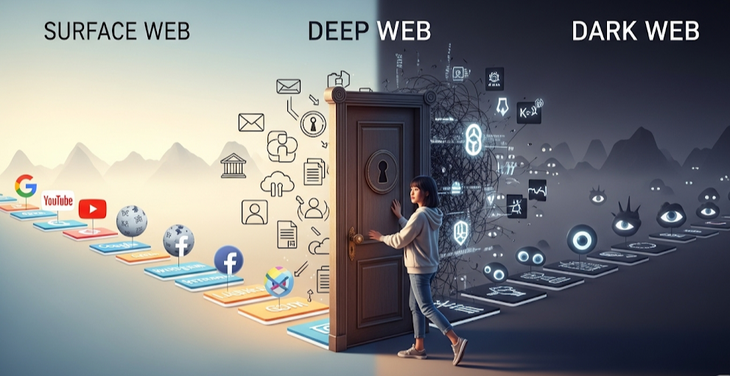
Your daily online activities could be how you interact with the Deep Web
Deep Web is not strange, it is an indispensable part to maintain privacy and information security on the Internet.
Understanding Deep Web Correctly
The Deep Web is the part of the Internet that is not indexed by regular search engines like Google or Bing. This means that you cannot find these websites simply by typing in a keyword and pressing search.
These sites are protected by a layer of security, such as passwords, login codes, or firewalls. The purpose of this protection is to ensure the privacy and security of personal information.
Most websites on the Deep Web contain legal and necessary content for work, study and daily life.
You have been interacting with the Deep Web every day through:
Email and social media accounts . When you log in to Gmail, Outlook, or your Facebook or Zalo account, all of your email content, messages, and private posts are part of the Deep Web. They are not public and only you have access.
Online banking accounts . Your transaction history, account balances and other financial information are all tightly protected in the Deep Web. Without your password, no one can access this information.
The internal management systems of the organizations you participate in . Companies, schools, and hospitals all have internal systems to manage human resources, student records, electronic medical records, and confidential documents. All of this data is only accessible to those with permission, and is located deep in the Deep Web.
Newspapers and journals. Many news sites and scientific journals require users to register and pay to read the full content. These articles and reports cannot be found through search engines.
Guide to Safely Using the Deep Web
Although the Deep Web is not as dangerous as the Dark Web, you still need to follow basic principles to protect yourself.
Use strong, unique passwords. Set complex passwords (including letters, numbers, and special characters) for important accounts. It's best not to use the same password for multiple accounts.
Be careful with unfamiliar emails and links, as phishing attacks are common and are used to steal login credentials. Phishers often send fake emails or text messages asking you to click on a link to update your information. Always double-check the sender’s email address and the website domain before entering any information.
Enable two-factor authentication (2FA). This is an incredibly effective extra layer of security. When you log in, in addition to your password, you will need to enter a verification code sent to your phone or email. This helps prevent bad guys from accessing your account even if they know your password.
Limit sharing personal information and remember to only provide personal information (phone number, address, ID card/CCCD number) when absolutely necessary and on reputable, highly secure websites.
Always log out of all accounts after completing work, especially when using public computers.
Source: https://tuoitre.vn/giai-ma-deep-web-va-cach-len-mang-an-toan-2025080614320246.htm


![[Photo] "Ship graveyard" on Xuan Dai Bay](https://vphoto.vietnam.vn/thumb/1200x675/vietnam/resource/IMAGE/2025/11/08/1762577162805_ndo_br_tb5-jpg.webp)





































![[Video] Hue Monuments reopen to welcome visitors](https://vphoto.vietnam.vn/thumb/402x226/vietnam/resource/IMAGE/2025/11/05/1762301089171_dung01-05-43-09still013-jpg.webp)






































































Comment (0)